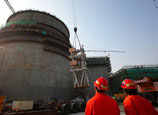
All this will depend highly on institutional innovations. The institutional reform in the late 1970s and early 1980s increased Chinese agricultural production and productivity (and therefore reduced the number of poor) at a rate that has never been observed in human history. But, China needs another round of institutional innovations to further transform its farming sector.
The most critical is land policy reform. A new policy should allow farmers to rent land or lease land rights and to increase their farm size. Related legal framework to ensure the enforcement of rural land contracts must be in place. Also, farmers and rural people should be compensated adequately for land requisitions. Related to this, policy is needed to establish social safety nets to protect the farmers and rural migrants in cities who are willing to give up their lands.
During this transformation process, farming models such as cooperatives, enterprises, individual family farms will coexist for some time. Of crucial importance is the need to create an enabling environment to allow these different models to compete, so that the entire agricultural sector can become more efficient and profitable. Since there will be regional differences in the way agriculture is organized, the government should try to support innovation and avoid promoting one-size-fits-all and top-down models.
There is a great potential for the private sector to invest in the farming sector. To encourage private investment in agriculture, policies such as tax concessions will be critical. Sound government regulation and careful monitoring are important to ensure that private capital actually moves into the farming sector.
The government should continue to improve its provision of rural infrastructure, market information, and financial and insurance services. The development of appropriate equipment and strategies to facilitate their use by farmers is also important.
China has the rare opportunity to transform its farming sector to ensure food security and safety, increase farmers' income, and consolidate rural-urban linkages for overall economic growth. This opportunity must be seized now.
The author is director general of International Food Policy Research Institute.

















 Buildings collapse after subsidence in S China
Buildings collapse after subsidence in S China


![]()
